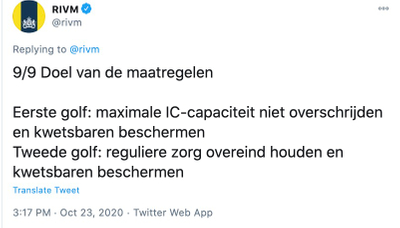This article was written by Chuan Ming Ong, an illustrator based in The Hague. First published here on November 1, 2020. It is based on a Twitter thread which Stichting Protect Everybody asked him to turn into an article. We felt it dissects very well the effects on the social fabric and the societal contract of a viral spread policy and analyzes very well various factors in Dutch and Western society that now make us less willing and able to tackle the pandemic.
If this pandemic has revealed anything it is that the Netherlands finds itself in the stranglehold of a neoliberal politics of indifference: indifference towards the immense loss of life, indifference to the crushing pressure on healthcare workers, and finally, indifference towards each other.
The knowledge that inside hospitals across the country people are dying excruciating and lonely deaths every single day, and that all this could have been prevented, makes the anti-Corona protests held on the Malieveld in the Hague, and the indifference they exude towards the immense human tragedy that is unfolding before our eyes, ever so heartbreaking to witness.
It is this very indifference that is so emblematic of that particular Dutch denomination of neoliberalism which seems to undergird the Dutch government’s approach to this crisis: a steadfast, yet misguided blind faith in the rational actor and the free market’s unbound capacity to solve societal ills. It was under the auspices of this political vision that the past few decades saw the transformation of our healthcare and educational systems into corporations in which cost-efficiency and non-intervention reign supreme. That these last two principles are, and will remain, the guiding compass for the Dutch Covid-response was made abundantly clear by Mr Rutte in his press conference last week, when he doubled down on his ambition to not “overdo measures if it’s not necessary.”[1]
Not only has the sitting cabinet been demonstrably negligent in its duty of care to the Dutch people since the start of the pandemic, it has fostered a culture of indifference and opaqueness, and exacerbated extant fault lines in Dutch society that may prove irreparable. The fog of secrecy that surrounds the decision-making process, and public health measures that are ever more contradictory and increasingly out of step with international consensus have sowed discord between those who agree with the chosen trajectory and those who do not, between the young and the elderly, the non-vulnerable and the vulnerable.
Mixed and inconsistent information creates a vacuum that Covidiots have now occupied
Perhaps more dangerously, the government’s mixed messaging and consistent lack of transparency, and RIVM chairman Jaap van Dissel’s repeated discrediting and downplaying of a growing body of international consensus knowledge,[2] have created an atmosphere of confusion and passivity, leaving an information vacuum that virus-denying conspiracy theorists are now eagerly seeking to take advantage of. At the same time, the bullheaded insistence on willfully ignoring knowledge and expertise gained in various Asian countries, whose citizens are constantly being painted as collectivist dupes that bend to the slightest sign of authority, is a worrying indication that key institutions have been operating on the orientalist and frankly racist assumption that “the West is liberating whereas the East is oppressive.”[3]

The consistent characterization of face masks as a form of liberticide,[4] [5] and the subsequent delay in adopting universal mask wearing[6] is but one example of how forwarded policies, and inversely, the reluctance to consider policies that have been successfully implemented in Asia, are at least in part informed by toxic cultural chauvinism steeped in classic orientalism reminiscent of the colonial era. In what might be one of the more ironic turns of events in recent history, a nation that once (smugly) prided itself on its stalwart progressiveness, internationalism and dynamism has turned out to be the embodiment of Ralph Waldo Emerson’s “hobgoblin of little minds, adored by little statesmen and philosophers and divines.”[7]
What makes matters worse is that government institutions are not even pretending they are aiming to protect each and every one of us, the citizens they are supposed to represent. Rather, they appear to be focused on exerting the minimum amount of effort required to avoid being held to account, all whilst preaching that we only have ourselves to blame and nothing is to be done. Individuals in key positions at the highest level of government have evaded any sense of responsibility and instead have met valid criticism with condescending defensiveness. Their subsequent attempt to shift the blame of failed policies onto individual citizens signals their indifference towards the gravity and import of the situation, and demonstrates that they do not feel responsible for the absolute mess they created in any way, shape or form.
This particular kind of pathological indifference has characterized our country’s attitude since February, when the disease was glibly laughed off as a Chinese problem, and later, during the first wave, when public outcry was practically absent as Dutch doctors and nurses were forced to work without proper protective equipment, and the elderly were left to die in the nation’s care homes. Paradoxically, however, national solidarity seemed to have reached its apogee at the time as healthcare workers were applauded daily and a majority of people stayed home.
A disengaging public
Now such cohesion seems to have dissipated, but the indifference was here to stay. In fact, it has flourished ever since on the fertile ground provided by our own political leadership, who have failed to act in accordance with the awesome responsibility vested in their office. Instead they have, through their inaction and eagerness to put the virus behind them, institutionalized and made into a structural and endemic presence a politics of indifference. Mr Rutte, de Jonge, van Dissel and others have lost sight of the fact that, as people in positions of authority, their own behavior—much like the virus that we are currently grappling with—is all the more easily passed on to others. The carefully planned press conferences and speeches reassuring the public that all is well, and the consistent labelling of voices who say otherwise as irrational fear mongers, have succeeded in reproducing what the American scholar Emily Roxworthy described as “the spectacular mode’s propensity to disengage its audience—to render even its participants as passive spectators,”[8] thus legitimizing a widespread sense of resignation among the general public.
The constant emphasis on personal responsibility throughout this crisis tells me one thing: that the government simply does not care what happens to me, to you, to us, as long as hospitals can cope with the influx of Covid-patients. What worries me, then, is the post-Covid world, and the potential societal ramifications that lie in the wake of the neo-liberal Dutch Covid-policy, one that is indifferent to loss of life and views these deaths as inconvenient collateral damage in an effort to keep the economy moving. How will we treat each other when this is all over?
And now: the call to take the hit and die for your country and its economy
Already some Dutch intellectuals are arguing that we should view the high and widespread mortality of the current pandemic as an inevitable, yet acceptable part of life. In a recent interview in the Algemeen Dagblad, academicians Mari Huijer and Rudi Westendorp argue that our unfettered sense of entitlement to the right to self-determination is to blame for our noble yet supposedly foolish wish to keep people alive even if the return on that investment would be minimal.[9] Together, they identify the culture of Dutch individualism as responsible for what they seem to see as a selfish desire to protect and preserve. Instead, they call for more collectivism and solidarity, presumably by dying and letting die for the nation.[10] But such reasoning is too easy, and not only is it yet another lazy excuse not to reexamine the fundamental principles with which we tackle this crisis, it contorts the true meaning of solidarity beyond recognition, and makes a nihilistic mockery of what it means to be human.
The current neoliberal strategy will not save people, because the faceless fiction that lies at its foundation was never concerned with human wellbeing. It would behoove Mr Rutte and the entirety of the Dutch government and related institutions to reconsider their tack, because neoliberalism has clearly run its course. We need leaders who govern with empathy, not cynical indifference. We need leaders who inform, not obfuscate. We need leaders who listen to people, instead of talking them down. We need leaders who have the courage to see the wider picture, instead of peddling in false dilemmas.
We cannot carry on with the same measure of indifference in future crises (and come they will) that are undoubtedly going to be more destructive and deadly than the one we are living through presently. We need to change course. To not do so would be unconscionable. The stakes are just too high.

Source materials:
[1] Mike Corder, “Dutch government holds off on new lockdown measures, for now,” The Washington Post, October 27th, 2020, web.
[2] “Van Dissel blijft erbij, mondkapjes hebben weinig effect,” NOS, October 2nd, 2020, web.
[3] Gloria Heyung Chun, “"Bridging the Gap": Cultural Interpreters of the World War II Era,” in Of Orphans and Warriors Inventing Chinese American Culture and Identity (New Brunswick, N.J.: Rutgers University Press, 2000): 64.
[4] “Kabinet: voorlopig geen landelijke mondkapjesplicht,” RTL Nieuws, July 24th 2020, web.
[5] Marinka Wagemans, “Arts-viroloog: 'Mondkapjesplicht is een verdere inperking van onze vrijheid',” NPO Radio 1, July 25th, 2020, web.
[6] Raoul du Pré, “Het mondkapje verplicht? Waarschijnlijk niet voor 1 november,” De Volkskrant, October 24th, 2020, web.
[7] Ralph Waldo Emerson, “Self-Reliance” In The Norton Anthology of American Literature, 9th Edition, Volume B. ed. Robert Levine (New York: Norton. 2017): 241.
[8] Emily Roxworthy, The Spectacle of Japanese American Trauma (Honolulu: University of Hawaii Press, 2008): 8.
[9] Annemieke van Dongen & Chris van Mersbergen, “Huidig coronabeleid is enorme schade aan economie, horeca, cultuur en zorg niet waard,” Algemeen Dagblad, October 24th 2020, web.
[10] Ibid.